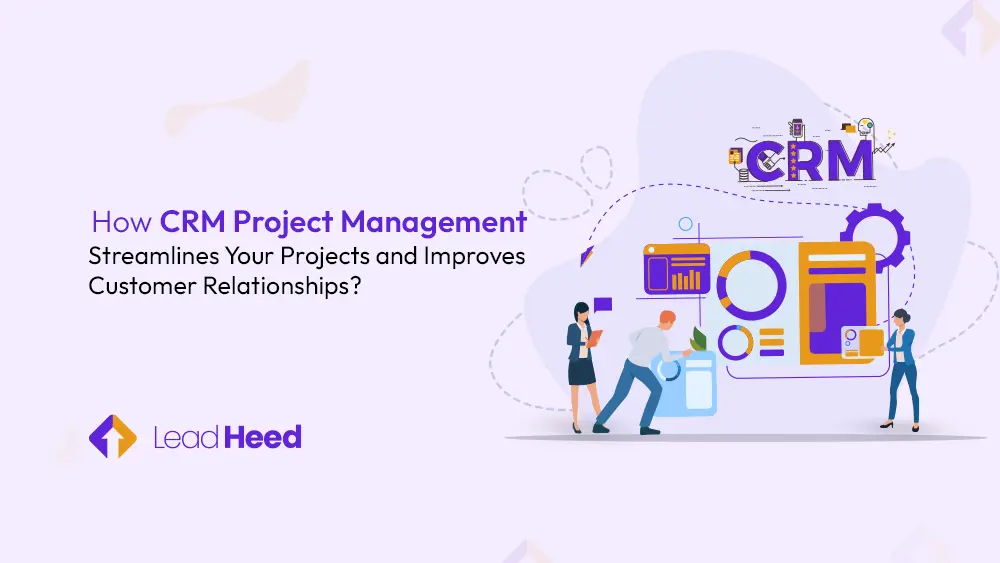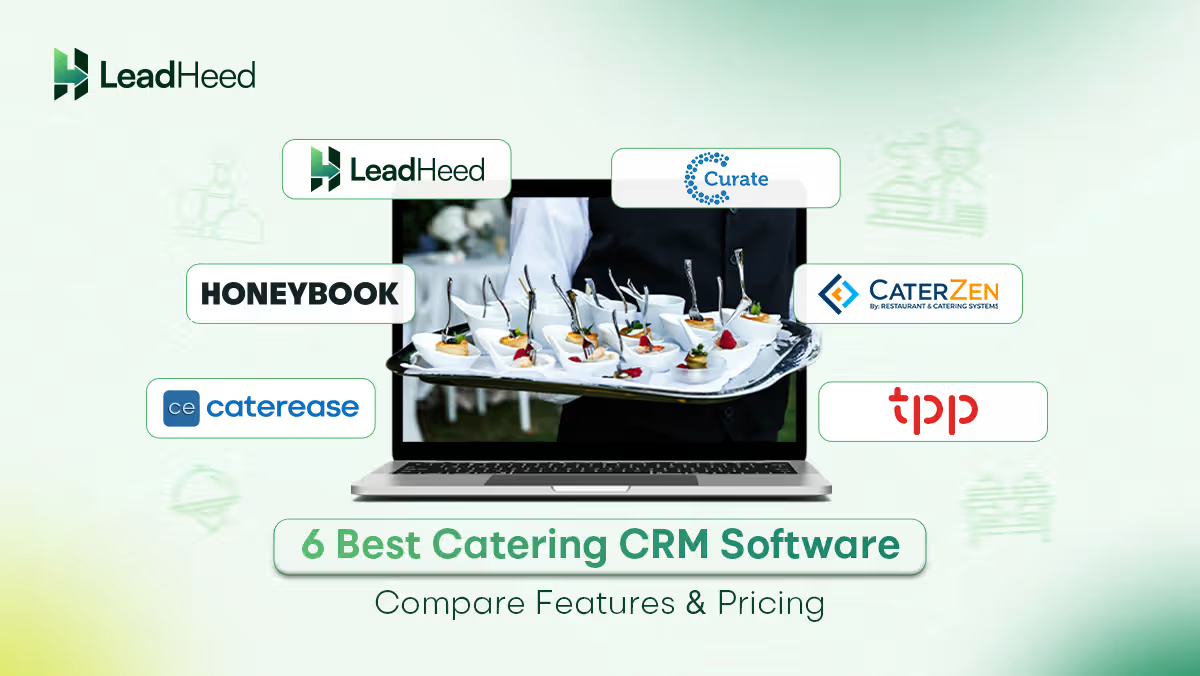Managing several projects while keeping clients happy can quickly get overwhelming. When deadlines are missed and important details are lost, miscommunication frustrates the whole team. Hours are wasted fixing mistakes, and customers can start losing trust. Without a good system, all this chaos can slow down your business.
This is where CRM project management makes a difference. By bringing customer information and project tasks together in one place, it helps teams stay organized, reduces repetitive work, and keeps everyone clear on their responsibilities. The result is smoother projects, happier customers, and better results every time.
In this guide, we’ll show how CRM project management can make your projects easier, improve teamwork, and help your business succeed.
What is CRM Project Management?
CRM project management is the process of using a Customer Relationship Management (CRM) system to plan, organize, and track projects while keeping all customer information in one central place. It helps teams manage deadlines, assign tasks, monitor progress, and follow up with clients efficiently.
Combining CRM with project management is crucial nowadays because it keeps your business organized, improves teamwork among employees, and boosts customer satisfaction. By linking customer data with project activities, organizations can make smarter decisions, respond faster, and keep projects aligned with client needs.
How CRM Project Management Works?
CRM project management helps teams stay organized, meet deadlines, and keep clients happy by bringing together all project and customer information in one place. It automates tasks and tracks progress along with customer interactions.
Here are the details of how CRM project management works:
1. Centralizing customer & project data
A CRM project management begins by collecting all customer and project details in one platform—like client info, project timelines, and past interactions. Having all data in one place reduces confusion, avoids duplicate work, and makes it easier for teams to coordinate. This helps your team members see the full picture and plan more efficiently.
2. Automating workflows & task assignments
Once the data is centralized, the CRM can automatically assign tasks and set workflows based on each project’s needs. This way, everyone knows what they are responsible for and when it’s due, without constant reminders. Automation keeps your projects on track and links every task to the right client or project info.
3. Tracking progress & customer interactions together
With tasks automated, the CRM tracks project progress alongside customer interactions. You can see milestones, task completion, and client feedback all in one view. This helps teams spot delays early and make quick adjustments, ensuring projects meet client expectations.
4. Reporting & measuring outcomes
Finally, CRM reporting combines project and customer data to measure performance. Metrics like task completion, client satisfaction, and revenue impact show what’s working and what needs improvement. With these insights, you can improve processes, boost team productivity, and strengthen client relationships.
Benefits of CRM Project Management for Businesses
CRM project management brings many benefits to businesses. It helps deliver smooth and personalized experiences for customers, keeps processes organized and avoids repeated work. It also provides smarter insights using AI and analytics. Let’s take a closer look at them:
1. Seamless and personalized customer experiences
CRM project management helps businesses track customer interactions and project details in one place, allowing teams to respond quickly and provide tailored support. Customers feel recognized and valued when their needs are anticipated and addressed on time.
This results in a smooth and consistent experience across all touchpoints. Personalized service increases customer satisfaction and loyalty.
2. Unified processes and reduced duplication
By centralizing data and workflows, CRM reduces the chances of repeating tasks or losing information. Your teams can follow standardized processes, which ensure consistency across projects. Everyone knows who is responsible for what, minimizing errors and confusion. This makes operations smoother and more organized.
3. Smarter insights with AI and analytics
CRM systems analyze project and customer data to provide actionable insights. Businesses can track performance, predict trends, and make informed decisions quickly.
Additionally, AI tools can even suggest improvements or highlight potential risks. Using these insights leads to better planning and stronger results.
4. Stronger cross-team collaboration
CRM project management allows different teams, sales, marketing, and support, to work together seamlessly. Everyone can access the same customer and project information, which improves communication.
Your teams can coordinate tasks, share updates, and resolve issues faster. This results in better collaboration and efficient project execution.
5. Greater efficiency and lower costs
Automated workflows and centralized data reduce manual work and save time. Your teams can focus on high-value tasks rather than repetitive processes. This efficiency lowers operational costs and helps projects stay on budget. Furthermore, you can complete projects faster while maintaining quality.
6. Smooth post-sale customer management
A CRM keeps track of customer purchases, follow-ups, and support requests after a sale. Teams can provide timely updates, resolve issues, and offer relevant recommendations. This continuity strengthens relationships and encourages repeat business. A smooth post-sale process increases long-term customer loyalty.
Key Features to Look for in a CRM Project Management System
Mobile access, customization, reporting and analytics, AI-powered features, data security, customer support, scalability, workflow automation, and ease of use are the key features to look for in a CRM project management system. Let’s see them closely:
1. Mobile access
A CRM with mobile access allows teams to update projects, check customer data, and communicate on the go. This ensures work continues smoothly even when employees are away from their desks. Mobile access increases flexibility and responsiveness.
2. Customization
CRM systems should be customizable to match your business processes, workflows, and project needs. Custom fields, dashboards, and workflows help your teams work the way they want. Tailored solutions improve efficiency and user adoption.
3. Reporting and analytics
Built-in reporting and analytics provide insights into project progress, team performance, and customer interactions. You can track KPIs, identify trends, and make informed decisions. This helps optimize projects and improve results.
4. AI-powered features
AI features in CRM can predict project risks, suggest task prioritization, and identify customer trends. By automating routine work, AI reduces manual effort and improves accuracy. This gives teams smart insights that make project management more efficient.
5. Data security
A secure CRM protects sensitive customer and project data from unauthorized access or breaches by using features like encryption, role-based access, and regular backups. This strong security not only keeps information safe but also builds trust with both customers and employees.
6. Customer support
Reliable customer support ensures that any issues or questions about the CRM are resolved quickly. Good support minimizes downtime and helps teams use the system effectively. It keeps projects running smoothly without interruptions.
7. Scalability
A scalable CRM grows with your business, handling more users, projects, and data as needed. This prevents the need for frequent system changes or upgrades. Scalability ensures long-term value from the CRM investment.
8. Workflow automation
Workflow automation handles repetitive tasks like assigning tasks, sending reminders, or updating project statuses. This reduces manual effort, avoids errors, and keeps projects on schedule. Automation improves team productivity and efficiency.
9. Ease of use
A CRM should be intuitive and user-friendly so teams can adopt it quickly without extensive training. Easy navigation and simple interfaces save time and reduce frustration. This encourages consistent use and maximizes the system’s benefits.
Best Practices for CRM and Project Management Integration
Involve users early in the setup, maintain clear and accurate data, define clear project stages, train teams for smooth adoption, track key metrics and performance indicators, and keep customer data synced in real time are the best practices for CRM and project management integration. Let’s see them briefly:
1. Involve users early in the setup
Include team members from sales, marketing, and project management during the setup process. Their input helps design workflows and features that match real work processes. Early involvement increases buy-in and reduces resistance to change.
2. Maintain clean and accurate data
Ensure that all customer and project data entered into the CRM is accurate, complete, and up-to-date. Regularly remove duplicates and outdated information. Clean data improves reporting, automation, and decision-making.
3. Define clear project stages
Establish clear project stages or milestones within the CRM to track progress effectively. Each stage should have defined tasks, responsibilities, and timelines. This clarity helps teams stay organized and meet deadlines consistently.
4. Train Teams for Smooth Adoption
Provide proper training to ensure all team members understand how to use the integrated system. Hands-on training, guides, and support help reduce errors and improve efficiency. Well-trained teams adopt the system faster and use it more effectively.
5. Track key metrics and performance indicators
Identify KPIs and metrics to measure project and CRM performance. Regularly monitor these indicators to evaluate team efficiency, project progress, and customer satisfaction. Tracking performance allows for timely adjustments and better decision-making.
6. Keep customer data synced in real time
Ensure that all updates to customer or project information are reflected immediately across the CRM and project management system. Real-time syncing avoids miscommunication and ensures everyone works with the latest data. This improves collaboration and customer interactions.
Common CRM Project Management Issues (And How to Fix Them)
Data silos & integration issues, low user adoption, lack of clear KPIs are some of the most common CRM project management issues. Let’s take a closer look at each of these challenges and explore how to solve them effectively.
1. Data silos & integration issues
Challenge: Most companies have a couple of tools and systems per department. This causes the information to get stuck in one location, and it is hard for teams to share info or get a clear view of the customer.
Solution: Implement one CRM platform that brings together all information in one place. Everyone can access accurate, up-to-date information, making collaboration and decision-making easier.
2. Low user adoption
Challenge: The best CRM software won’t do any good if your employees aren’t using it properly. Employees can resist change, consider the system to be complex, or stick to old habits.
Solution: Give hands-on training, streamline the CRM system, and encourage adoption by incentivizing or rewarding. The more comfortable your staff is, the easier the system will be adopted.
3. Lack of clear KPIs
Challenge: Without defined goals, it is difficult to define success for your CRM project. Teams will quantify non-relevant measures or lose track of what is most important.
Solution: Define clear Key Performance Indicators (KPIs) from the outset. For example, measure lead response time, customer satisfaction, or sales conversion. This gives your team definable goals and a simple means of tracking progress.
Conclusion
CRM project management helps businesses stay organized, keep projects on track, and improve customer relationships. With CRM project management, you can keep all customer info and project tasks in one place, automate routine work, and track progress easily. This means smoother teamwork, happier customers, smarter decisions, and faster project completion.
To make it even simpler, LeadHeed CRM brings all your projects and customer data together in one easy-to-use platform. It helps your team stay organized, reduce mistakes, and deliver personalized experiences that your customers will love. With LeadHeed, you can focus on growing your business confidently while your CRM handles the busy work behind the scenes.
Simplify project management and delight your customers—try LeadHeed CRM today.
FAQs
What is CRM project management?
CRM project management means using a CRM system to manage projects and customer interactions in one place. It helps teams stay organized, track tasks, collaborate better, and provide a smoother experience for customers.
How do I manage a CRM project effectively?
To manage a CRM project effectively, set clear goals, involve the right team, and keep data accurate. Automate workflows, track progress with KPIs, provide proper training, and use analytics to optimize performance.
How to manage a CRM project?
To manage a CRM project, define clear goals, involve key team members, and maintain accurate data. Automate workflows, track progress with KPIs, provide team training, and use analytics to optimize results.
How to integrate CRM with project management?
To integrate CRM with project management, start by centralizing all customer and project data in one system. Connect workflows so tasks, deadlines, and customer interactions are linked. Automate routine processes, sync data in real time, and ensure teams have proper training. Finally, track performance and use analytics to optimize both project execution and customer management.
What challenges come with CRM Project Management?
CRM project management can face challenges such as handling large volumes of data and keeping it accurate, integrating with other business tools, and ensuring team adoption of the system. Businesses may also struggle with customizing the CRM to fit project needs and setting up proper tracking and reporting.



